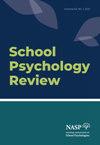A Mixed Methods Approach to Exploring Social Emotional Learning Program Implementation in an Alternative High School
IF 3
3区 心理学
Q1 Social Sciences
引用次数: 0
Abstract
AbstractSchools are turning to research-based social emotional learning (SEL) practices to improve student achievement and school progress. Research to support SEL implementation, however, has lagged behind outcomes-based evaluations, often resulting in poor SEL program quality and fidelity. This mixed methods study explores SEL implementation at a high-needs high school to determine the extent the program’s implementation adhered to the identified model. The findings indicate the study school only minimally implemented the evidence-based model due to barriers also cited in peer-reviewed research and, therefore, the evidence-based program was not implemented as intended. This study validates the need for research to shift attention from efficacious outcomes-based studies toward establishing best implementation practices to ensure interventions are transferred and implemented with fidelity. Doing so should strengthen adherence to evidence-based models, improve the overall quality of SEL program implementation, and increase the likelihood of achieving the desired outcomes attributed to SEL program implementation.Impact StatementCurrently the lack of evidence-based SEL implementation practices places schools interested in SEL at risk of poor program implementation in their unique settings. The findings in this study indicate there is a need to develop evidence-based SEL program implementation practices to support implementation in a context-specific manner that produces the desired outcomes, particularly in schools serving diverse student populations focused on closing race and income-based achievement gaps.Keywords: Social emotional learningprogram implementationfidelityalternative high schoolASSOCIATE EDITOR: Chunyan Yang DISCLOSUREThe authors report there are no competing interests to declare.Additional informationNotes on contributorsKristen FordDr. Kristen Ford is a manager of Design and Development at Western Governors University. Her research interests include pedagogical approaches that advance learner achievement and educational equity.Annette AndersonDr. Annette Anderson currently serves as an Assistant Professor and Faculty Lead for School Administration & Supervision in the School of Education. She is also the Deputy Director of the Johns Hopkins Center for Safe and Healthy Schools and one of the three co‐founders of the eSchool+Initiative.Yolanda AbelDr. Yolanda Abel is an Associate Professor and immediate past chair of the Department of Advanced Studies in Education at Johns Hopkins University School of Education. She is also a faculty affiliate with Center for Social Organization of Schools, the Center for Safe and Healthy Schools and the Center for Africana Studies.Marcia DavisMarcia Davis, PhD, is a director of the Center for Social Organization of Schools, the research director of the Baltimore Education Research Consortium, and an associate professor in the School of Education at Johns Hopkins University.以混合方法探讨另类高中社会情绪学习计划的实施
摘要学校正在转向基于研究的社会情感学习(SEL)实践,以提高学生的成绩和学校的进步。然而,支持SEL实施的研究已经落后于基于结果的评估,经常导致SEL项目的质量和保真度较差。这项混合方法研究探讨了高需求高中的SEL实施情况,以确定该计划的实施程度与所确定的模型的一致性。研究结果表明,由于同行评议研究中也提到的障碍,研究学校仅最低限度地实施了基于证据的模型,因此,基于证据的项目没有按计划实施。本研究证实,研究需要将注意力从有效的基于结果的研究转向建立最佳实施实践,以确保干预措施的转移和实施保真。这样做应该加强对循证模型的坚持,提高SEL项目实施的整体质量,并增加实现SEL项目实施预期结果的可能性。影响声明目前,缺乏基于证据的SEL实施实践,使对SEL感兴趣的学校在其独特的环境中面临项目实施不力的风险。本研究的结果表明,有必要制定基于证据的SEL项目实施实践,以支持以特定环境的方式实施,以产生预期的结果,特别是在为不同学生群体服务的学校,重点是缩小种族和收入为基础的成就差距。关键词:社会情感学习项目实施忠诚另类高中副主编:杨春燕披露作者报告无利益冲突声明。作者简介:克里斯汀·福特博士。克里斯汀·福特(Kristen Ford)是西部州长大学设计与开发学院的经理。她的研究兴趣包括促进学习者成就和教育公平的教学方法。安妮特AndersonDr。安妮特·安德森(Annette Anderson)现任教育学院助理教授兼学校管理与监督系主任。她也是约翰霍普金斯大学安全与健康学校中心的副主任,也是eSchool+倡议的三位联合创始人之一。尤兰达AbelDr。约兰达·阿贝尔是约翰·霍普金斯大学教育学院教育高级研究系的副教授和前任系主任。她还是学校社会组织中心、安全与健康学校中心和非洲研究中心的教员。Marcia Davis,博士,学校社会组织中心主任,巴尔的摩教育研究联盟研究主任,约翰霍普金斯大学教育学院副教授。
本文章由计算机程序翻译,如有差异,请以英文原文为准。
求助全文
约1分钟内获得全文
求助全文
来源期刊

School Psychology Review
Social Sciences-Education
CiteScore
6.90
自引率
20.00%
发文量
54
期刊介绍:
School Psychology Review (SPR) is a refereed journal published quarterly by NASP. Its primary purpose is to provide a means for communicating scholarly advances in research, training, and practice related to psychology and education, and specifically to school psychology. Of particular interest are articles presenting original, data-based research that can contribute to the development of innovative intervention and prevention strategies and the evaluation of these approaches. SPR presents important conceptual developments and empirical findings from a wide range of disciplines (e.g., educational, child clinical, pediatric, community.
 求助内容:
求助内容: 应助结果提醒方式:
应助结果提醒方式:


